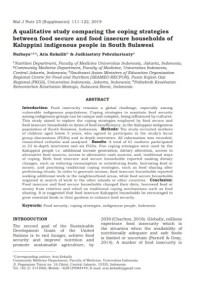A qualitative study comparing the coping strategies between food secure and food insecure households of Kaluppini indigenous people in South Sulawesi

Abstract:
Introduction: Food insecurity remains a global challenge, especially among vulnerable indigenous populations. Coping strategies to maintain food security among indigenous groups can be unique and complex, being influenced by cultures. This study aimed to explore the coping strategies employed by food secure and food insecure households in times of food insufficiency, in the Kaluppini indigenous population of South Sulawesi, Indonesia. Methods: The study recruited mothers of children aged below 5 years, who agreed to participate in the study's focus group discussions (FGDs) and in-depth interviews. All information was recorded, transcribed verbatim and analysed. Results: A total of 61 mothers participated in 22 in-depth interviews and six FGDs. Five coping strategies were used by the Kaluppini people i.e. additional income generation, dietary alteration, access to alternative food sources, access to alternative cash sources, and, traditional ways of coping. Both food insecure and secure households reported making dietary changes, such as reducing consumption or substituting foods, borrowing food or money, and practising traditional coping strategies, such as food sharing after performing rituals. In order to generate income, food insecure households reported seeking additional work in the neighbourhood areas, while food secure households migrated in search of work to the other islands or other countries. Conclusion: Food insecure and food secure households changed their diets, borrowed food or money from relatives and relied on traditional coping mechanisms such as food sharing. It is suggested that food insecure Kaluppini households be encouraged to grow essential foods in their gardens to enhance food security.
Detail Information
| Series Title | : | - |
| Call Number | : | - |
| Publisher | : | : Mal J Nutr., 2019 |
| Collation | : | Mal J Nutr 25 (Supplement): |
| Language | : | English |
| ISBN/ISSN | : | - |
| Classification | : | NONE |
 Computer Science, Information & General Works
Computer Science, Information & General Works  Philosophy & Psychology
Philosophy & Psychology  Religion
Religion  Social Sciences
Social Sciences  Language
Language  Pure Science
Pure Science  Applied Sciences
Applied Sciences  Art & Recreation
Art & Recreation  Literature
Literature  History & Geography
History & Geography